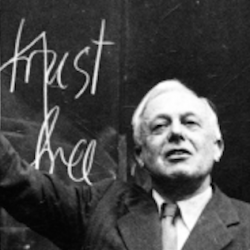Underlying Rosenstock-Huessy’s entire discussion of the diseases of speech is the assumption that language establishes relations. In this, Rosenstock-Huessy is again assaulting one of the premises of modernity, namely, the centrality of the Ego, and the consequent notion that language exists so that the Ego can express its thoughts and feelings. Language is fundamentally social and political, and it’s the main medium through which human relationships are achieved.
Grammar is the leading social science because language is the leading means of social relation and because grammar is language come to self-consciousness. All human relations require speech, and certain kinds of relation demand a specific kind of speech. We can have sex without the intervention of the spoken “I do” and “you are man and wife,” but it can’t become a marriage without this speaking (Speech and Reality [SR] 119).
As he explains in the Practical Knowledge of the Soul (PKS; pages refer to typescript, not printed version), the primacy of the Ego is embodied already in Greek grammar, which makes the “I” the “first person.” But “all our experience teaches us exactly the opposite of this Greek premise, that the single ‘I’ is primary.” A child develops by “gradually stak[ing] out its borders as an independent entity,” by siphoning out the “thousand cares, impressions, and influences which surround, flow around, and beset it.” What a child first recognizes is not a world, nor father and mother, but “that it is spoken to”: “It is smiled at, entreated, rocked, comforted, punished, given presents, or nourished. It is first a ‘you’ to a powerful being outside itself – above all to its parents” (PKS 16).
Goethe said that a father is always his daughter’s first god; Rosenstock-Huessy agrees, adding that “He is so because he is present for his daughter before her own ‘I’ is, and because he bestows on her the consciousness of herself, by addressing her as ‘you’” (PKS 16). Before we can articulate anything about our own existence, we hear “other say that we exist and mean something to them.” Thus, “we develop self-consciousness by receiving commands and being judged from outside. In the face of these commands and judgments, we perceive that we are someone special, and being something different or special is the fundamental experience of the ‘I’” (PKS 16).
We become Egos in response to commands. A child may describe himself in third person, but in response to a command, he is forced to a Yes or No: “These two words are only apparently mere interjections. Actually, they are expressions of the truly divine ‘I’ personality, the foundations of the omnipotence given us. To say ‘yes’ and ‘no’ means to create and resist, to suffer and to create suffering” (PKS 17).
The parental command is one imperative that confronts us before we come to say “I.” Love is another transforming imperative by which we find ourselves: “Love doesn’t dally like a flirt, playing around with small talk. Love transforms. It implores and commands. So the ‘you’ is virtually discovered for the first time in the imperative which arises from the transformation love creates.” Philosophy cannot encompass the second person: As soon as there is an effort at a philosophy of “you,” it ceases to be philosophy (PSK 21).
Again, “All self-recognition, all of an ‘I-s’ self-knowledge, is produced by summons, by an individual’s definite feeling that a concrete challenge has hit home. His childhood gods want, as do those of his father and mother, or of anyone else. . . . The imperative may erupt from unexpected sources, but it is always the imperative which forces a soul to come forward and which unfolds its powers into the realm of the body as well as that of the spirit” (PKS).
In the Origin of Speech (OS),he argues that the modern separation of act and speech dishonors both: “Speech is made a tool of thought. Both are contrasted with action. But no society knows of any social act without a division of labor as Marxians say, or without the Word as the Christians claim. Both are right, the godless and the godly. There is no social action which can be contrasted with speech. All acts are embedded in speech and the movement created by the first imperative ‘March into Germany,’ carries all the actions of millions of men until it can die in the last platoon’s report” (OS 51).
In the course of developing this point, Rosenstock-Huessy highlights the physicality of human language. Language is a “physical medium of social intercourse to establish relations,” in a way that words are analogous to handshakes (SR 116).
Rosenstock-Huessy insists on the physicality of language, and its embeddedness in society: “The relations between people are established by physical and physiological processes. . . . The functioning of the larynx, the mouth, the ear, in functioning for this purpose, cannot be isolated from the social system into which it fits. Without a system of respiration, the function of our lungs cannot be interpreted. Without a system of social relations, our phonetics and our linguistic technique remains meaningless” (SR 116).
Shaking hands establishes an intimate physical connection, so much that the Greeks described shaking hands as “being planted into each other’s hands.” Rosenstock-Huessy wants to say that language, speech and listening, also employs physical means to establish relations (SR 115).
Different postures, and different intonations, are suitable to different sorts of speech: “All language exploits large parts of our body, in making us serve as cosmic agents of news. In singing, however, more and deeper parts are set in motion than in parliamentary debate or scientific discussion. The reason probably is that in singing we are carefree, disarmed, and can let go.
In rational discussion, we barely move our lips, and, with the rest of our body, we sit tight. In telling a story, the tale of things past, the epic rocking chair tone is that of the man who has spent his real energy in the past of which he is going to tell a story right now.” When giving commands, we use “a different intonation” because “it takes years to acquire the voice of command that is without flaw and effort, neither shrieky nor embarrassed but irresistible” (SR 127).
How? In various works, Rosenstock-Huessy describes the relational effect of language in different ways. In Speech and Reality, he notes initially that there are four basic forms of relation when two or three are gathered: unanimity, one spirit; split, dubious, strangers; the speaker depends on the listener, because the listener is supposed to act on what the speaker says; or the listener depends on the speaker, because the speaker has acted already (SR 117).
Similarly, there are four forms of silence, which means a lack of relation: When there is no audience to address, when there is no one to issue a command, when two persons are strangers, when two people are so close that nothing need be said (SR 118). Situations 1 and 2 await the right time, situations three and four await a proper scene.
The four forms of relation need to be unpacked a bit. The first form of relation is one in which there is already agreement between speaker and listener. They already share one spirit, and don’t need to achieve one spirit. This is, to think of the Cross of Reality, the situation of a unanimous “inside” group.
The situation of strangers is that of a speaker and listener who are “outside” one another, with no common spirit and no common language. The lines of dependence between speaker and listener can go in either direction; the speaker is at one moment at the top of the hierarchy, and the listener is at the top in another moment.
These relations occur along the temporal axis of the cross of reality: The speaker issues a command, and then is dependent on the listener for the command to be fulfilled; and he will remain dependent on the listener until the listener returns with a report that the command is accomplished. In the last of the relations, the listener is dependent on the speaker who has already spoken. Speech forms their relations with one another, and forms their relations in a specific way. The particular kinds of relations are dependent on achievements or failures in speech.
Rosenstock-Huessy says that speech forms and nurtures relation because speech transfers some action. If I have experienced something and narrate a story, I am transferring the action of my experience; I might transfer the experience so that my action is reinforced through a song or through an invitation; I might transfer it in a way that eliminates objections, when I say that so-and-so is doing thus-and-such; or, I may transfer the action by commanding someone else to do it, so that I don’t have to do it myself (SR 120).
These four types of speech thus point to four types of relation: Old and young are in succession, as the old utter sacramental words to be repeated by the young; friends are in agreement, so that their relation is like a soloist and a chorus; strangers are people in disagreement, and depend on question and answer; and leader and led are in a command and response relationship (SR 124).
Each of these relations also points to a particular pole of the Cross of Reality. Imperatives are not “placed in the future” but “the future is what needs action.” Thus, imperatives are directed toward the future. In the inner circle, we sing together, and “in singing, we are less remote from other minds than in other forms of communication.” Outside, everything is at a distance from everything else, and the indicative and language of the eyes dominates. The interrogative mood is for strangers, and for mental strangers, participants in a Platonic dialogue, for instance (SR 124-6).
In sum, “Magister and disciple, singer and chorus, leader and respondent are of equal originality in their linguistic situation as the interlocutors of a discussion in the form of question an answer. By isolating the interrogatory mood, the origin of question and answer was inexplicable until today. As soon as we compare the prosaic process of question and answer to its parallels in historical tradition (formula and repetition), in musical unanimity (singer and chorus), in political challenge (imperative and response), question and answer are disclosed as one application of the general principle of social relations to be established through speech, the application to the meeting of two people from different spaces, and therefore of a different standard of objectivity” (SR 126).
In Origin of Speech, Rosenstock-Huessy elaborates this point somewhat differently. Speech, he says, removes the skin that separates human beings and unites them together. His specific point has to do with imperatives. An order given by one person initiates a series of actions by those who are under his orders; but the action is not done until it is reported back – not in an imperative but in an indicative.
The order-and-report sequence creates “one common time” between the commander and the one obeying the order, a “supertime” that “neglects the separation of two bodies and their biological times.” Speech creates a single time. This is not accurately described as a “common frame of reference” since a “‘frame’ seems to exist outside our sayings or acts.” It is rather a “field of correspondence” that “breaks down the separation of two ‘self-contained’ bodies; it gets ‘under the skin,’ and they act as a single will from the moment the order is given to the moment it is reported fulfilled. After this, the field collapses and disappears.”
The dissolution of “skin barriers” that separate individuals has been symbolized in various ways: Ancient peoples “expressed the experience that they formed one body with one skin. They went together under one hid, or they spoke of the body politic, or they drank each other’s blood” (OS 47).
















